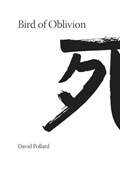' David Pollard has the poet's preoccupation with the limitations of language in his compelling collection, Bird of Oblivion. He approaches the painful subject of a loved one's dementia obliquely, often using nautical metaphors to explore how it feels to be utterly powerless. This distancing technique frees him to write with unflinching honesty, taking the reader straight to the heart of suffering.
The flowing, unpunctuated lines and surging rhythm mirror the energy of the sea. The darkness in this collection is illuminated by moments of grace.
There is a psalm-like beauty in these lines. The speaker's quest for meaning is precarious, almost breaking down in the moving elegy,
Agenda Review
David Pollard brings a lifetime's intellectual stringency to his work, yet never loses sight of the human heart. In Bird of Oblivion, his lyrical gifts have found a deep seam of emotion. Here are poems which hang together as if written in a single sweep. And yet each remains a quiet gem with its own story to unpack.
On one level, Bird of Oblivion is a moving response to his wife's deepening dementia. But like all the best poetry, it invites different interpretations of its core theme. Loss is ultimately a journey we all travel. Though bleak, loss is not without its compensations. These poems suggest we can look for, and sometimes recover, something of the essence of what has slipped away. The collection opens with 'Love Poem':
. . . It seems no time since we lay down
into an oblivion of time's vain dawn
in the ruby wound of our watch
and rode the river past the tatters
we had shaken off of all the world
and sparrows were in the rosebush of your hair . . .
One of the pleasures of this collection is the richness of its language: cadences that flow like rivers, sonorities that cry out for performance. And always the sea, which is "black as widows' eyes", "the tide rolls with a sound like sin", "for here there is no turning,/ only the lie of the sea and the lie of the word/ and the spit of rocks just beyond the audible."
And under it all, a current of Biblical and Shakespearian allusions that surface so subtely:
Pollard's many years as an amateur sailor weaves a nautical leitmotiv through much of the collection. Towards the end of 'Love Poem', the sea becomes threatening:
" . . . and we ignored the coming gale
and its rising roar as an alchemy of unkind metals
cast all meaning out and the following wind
betrayed the past and we were blood
and bone of ourselves and fleeing over the waters.
and you had blackbirds on your bright tongue
that brings me comfort still.".
By eschewing commas, Pollard creates a sense of inevitability, a force that can't be controlled, a breathless rush towards fate: "beyond the currents of past love/ and our failed way of telling it/ and on/ an
Sometimes the pain of loss is depicted visually and rhythmically in splintered phrases, as in 'The Day of Ashes', where the final word is literally "silence".
The penultimate poem, 'Blackbird, my blackbird' is a heart-wrenchingly beautiful sequence of twelve short pieces. Everything that makes Pollard an important poet is here.
Blackbird, my blackbird with your crooked wing
struggling along the dust
and cradle of our hopes:
your plaintive call so godless and unkind
can reach our ears no longer . . .
I ask you gentle reader, gentle spirit, gentle friend
with what words can such days as these by climbed?"
If anyone has found the words, it's David Pollard.
Tears in The Fence Review

